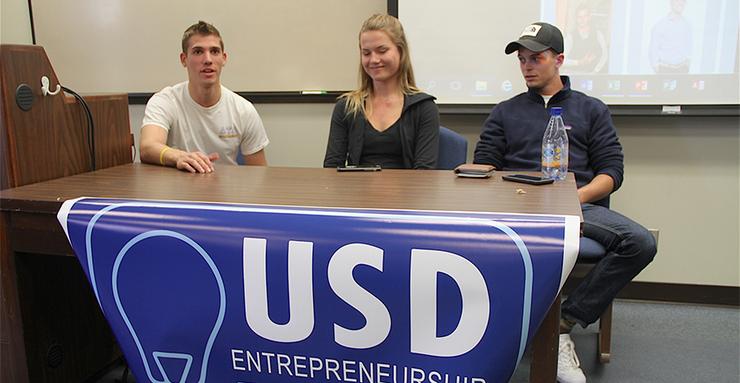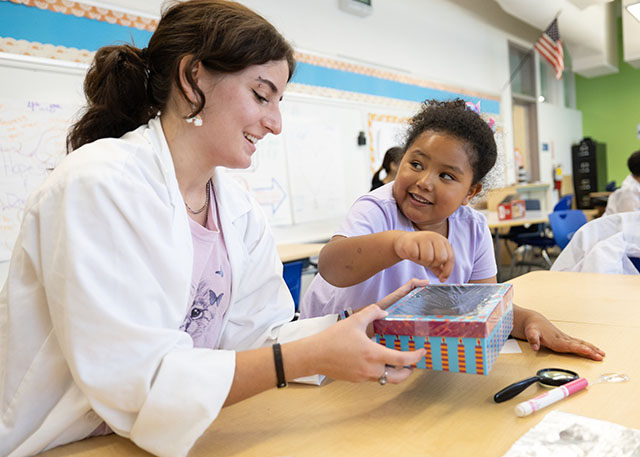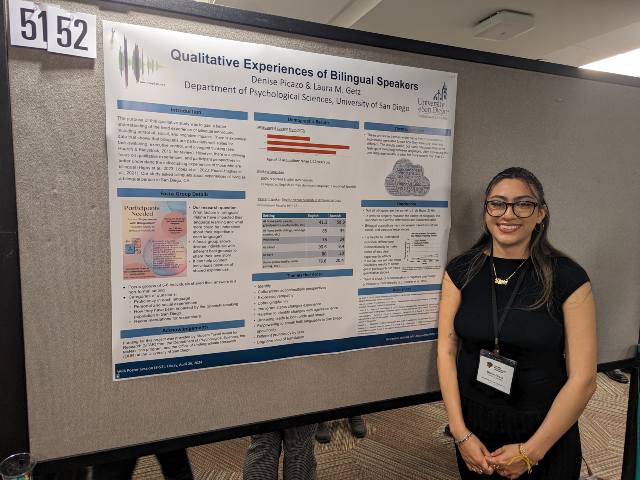Greek Life Entrepreneurs Share Knowledge about Business Start-Ups
 Warren Lorenz, far left, makes a point during a USD Entrepreneurship Club event. Lorenz, Irina Gedarevich and Robert Walker, all current students and Greek Life members, talked about their businesses.
Warren Lorenz, far left, makes a point during a USD Entrepreneurship Club event. Lorenz, Irina Gedarevich and Robert Walker, all current students and Greek Life members, talked about their businesses.Dane Baker describes the University of San Diego Entrepreneurship Club as an organization where student entrepreneurs can "foster innovation," and where students in any major and with any business idea, can connect to the club's resources.
On Tuesday, Baker, the club’s new president, demonstrated what he meant with the club's first spring semester event: a question-and-answer session with three USD student entrepreneurs who've successfully launched a business while attending college. All three are also members of USD's Greek Life community.
Robert Walker, a member of Beta Theta Pi, is a co-founder and CEO of Think Eat Lift, a fitness and lifestyle business that has a mobile app, a website and more than 127,000 YouTube channel subscribers.
Alpha Chi Omega's Irina Gedarevich is a behavioral neuroscience major who, along with siblings, created Organic Babee, which specializes in baby clothing made from 100 percent organic cotton and even has its own manufacturing company for its products.
Delta Tau Delta's Warren Lorenz is CEO of the recently launched Tech Meets Trader, which provides a free social community for stock and options investors. Prior to the public launch of the business, one of his biggest claims to success was winning $25,000 in important seed funding as a finalist in USD's Venture Vetting (V2) Pitch Competition last year.
Driving Business Through Passion
Each student has a self-driven passion that's been critically important to their respective needs. Finding it is a must for anyone wanting to start a business.
Walker said his audience-based business thrives because he and his business partner, Radu Antoniu, have cultivated an audience that has similar goals and is passionate about fitness. "When I see the results pouring in from our subscribers, that's what gets me up in the morning."
Given the early hours of the financial markets, Lorenz and his fellow employees start each weekday a little before 5 a.m. and there's already plenty of activity among its users. "I love to wake up to a blank slate and create something out of nothing," Lorenz says. "Every day is a unique day, especially in the financial markets because they're always moving."
Gedarevich, whose business started just prior to her arrival at USD, is now at a point where she's able to provide leadership and direction to others. That's very important as she's juggling 21 units in her final semester at USD, she does some babysitting and does her part in the company. "I'm so passionate about it that I don't see it as work," she says.
Risk, Experience and Motivation
Another way to know that Gedarevich is thriving is because she's been through all of the start-up headaches and obstacles that can easily derail it. "Throughout this journey, I've made so many mistakes. Since I'm a science major, I'm science-oriented. I had to do everything myself, all the steps to do the business. When you're doing that, you might just think, "if I quit now, I can have all the time I want,' but after I got through all of the business side of it, I've been rewarded the last four years."
Starting a business is taking a risk, but Walker, Gedarevich and Lorenz have built their businesses based on experience and sources of motivation to do it.
Walker followed in the footsteps of an older brother whose entrepreneurial spirit led him to a multi-million-dollar supplement company. Think Eat Lift started as a full-on marketing affiliate for Kinobody fitness company before finding its own path to success. Lorenz was working in construction at age 16 and was already passionate about trading stocks. He later joined another USD student-created business, Alumnify, that won the V2 competition, but he left and then has worked hard to make Tech Meets Trader a reality.
Gedarevich credited her parents, who immigrated to the U.S. from Ukraine, for setting an example that translates to the business world. "Had my dad and mom not risked everything to move here, I wouldn't be where I am now. That mentality was passed on to me and my sisters."
Good Advice
While each has found a level of success, likely the best aspect of the Entrepreneurship Club event for students in the full Olin Hall classroom was the good advice about having business start-up aspirations.
"I feel like people in college are always trying to bite off that billion-dollar idea right now and they haven't learned anything. How can you learn from your mistakes if you haven't made any? Just really think about what you need to learn to get to where you want to go instead of just jumping into it. Don't bite off more than you think you can chew right off the bat," Walker said. "Secondly, people don't buy what you do, they buy why you do it. Pay attention to why you are doing what you are doing. We're growing because we're focusing on why we're doing it. We're pleasing our audience and making way more money because of it."
Gedarevich agrees with Walker on educating yourself, but her advice was to encourage entrepreneurs to rise above fear and get going. "You have to start somewhere or you're never going to start. If you want to make a change or you have something on your mind, take that first step and do it."
Lorenz agrees on preparedness, and specifically to have a skill set fully capable of delivering.
"You have to be able to do it all. As the founder of a business, if you can't do any portion, you need to have a co-founder who can. Look at your team as a toolbox. If you have the entire toolbox to build what you need to build then great, go for it. But until that point, if you don't have the skills, don't have the knowledge or the confidence, then you should work on those, build that skill, that trait before starting anything. You do learn your biggest mistakes through failure, but failure's the worst way to learn."
— Ryan T. Blystone



